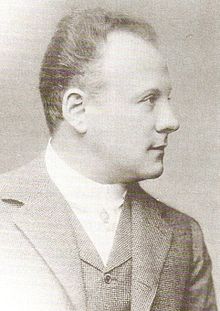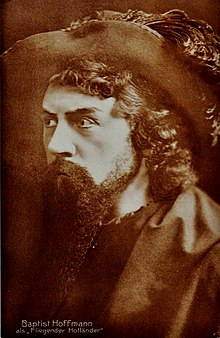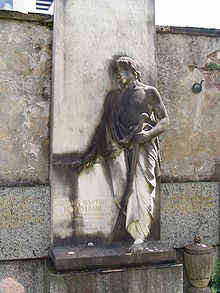Baptist Hoffmann
Johann Baptist Hoffmann (born July 9, 1863 in Garitz ; † July 5, 1937 in Bad Kissingen ) was a German opera singer (baritone).
Life
Baptist Hoffmann was the fifth child of Wolfgang Melchior Hoffmann († November 20, 1880), an owner of a materials store from Ochsenfurt and part-time trombonist in the Kissinger Kurorchester and Margarethe Hoffmann, née. Guck, a talented alto singer in the church choir, whose father ran a guest house in the summer months in which Friedrich Wieck , Clara Schumann's father , had stayed. After the death of Baptist Hoffmann's father, Margarethe Hoffmann, after initially being skeptical about her son's professional singing career, became her son's artistic supervisor.
Although August Kindermann and other singing teachers in Munich had judged Baptist Hoffmann to be unsuitable for opera singing, he was able to begin training at the Weinlich-Tipka singing school in Graz . After 16 months of study, Baptist Hoffmann experienced his first successes at a charity event in Graz and in an opera by Conradin Kreutzer at the Cilli music association .
He then got an engagement at the Graz Opera House, where Valentin in Charles Gounod's Faust and the leading role in Richard Wagner's Der Fliegende Holländer were among his other successes. In 1890, the director of the Deutsche Oper in New York wanted to engage Baptist Hoffmann, but to no avail, as Baptist Hoffmann had been working at the Cologne City Theater for four years since September 1888. The call to the Bayreuth Festival by Cosima Wagner failed when it turned out that Hoffmann should not sing Wolfram von Eschenbach in Tannhauser , as originally agreed , but rather Alberich in the Ring des Nibelungen . In 1892 and 1893 Hoffmann refined his skills with Julius Stockhausen in Frankfurt am Main .
When Baptist Hoffmann signed up for the Stadttheater in Hamburg and Altona, his reputation had spread throughout the German Empire . From the summer of 1895 Hoffmann gave guest performances as Hans Sachs in the Meistersinger von Nürnberg on the initiative of the Berlin general manager Count Bolko von Hochberg and - after appearances throughout Germany as well as Austria and Holland - as Lysiart in Carl Maria von Weber's Euryanthe . After the immediate admiration by the audience in Berlin, who compared him to his predecessor Franz Betz , after initial hesitation, the critics also recognized him. In 1897 Hoffmann almost moved to the Vienna Court Opera with Gustav Mahler , who was then Kapellmeister at the Hamburg Opera, but was already tied to his subsequent engagement at the Berlin Court Opera.
When the death of his mother plunged him into a deep life crisis in 1908, Hoffmann wanted to give up singing after his engagement in Berlin was scheduled to expire in 1910, but found new energy through a longer stay at Schloss Hornegg am Neckar. In November 1910, for example, he appeared as a minstrel in Engelbert Humperdinck's opera Königskinder , after Humperdinck had insisted on casting the role with Hoffmann. The initially planned eleven performances became an engagement until 1915.
After finishing his stage career in 1919, Hoffmann began to train young singers. At first he was able to live on his fortune, but the inflation after the First World War forced him to give lessons for the purpose of living. In autumn 1928 he was appointed to the Stern Conservatory.
Hoffmann's last public appearance took place as part of a charity event for the repair of the organ in Bad Kissingen's Herz-Jesu parish church . On July 5, 1937, Baptist Hoffmann died of a heart attack while talking to a friend while on a spa stay in Bad Kissingen. His grave is in the Bad Kissingen chapel cemetery .
The archive of the Berlin University of Music contains records with vocal recordings by Baptist Hoffmann. In 1995 Diji-Rom, New York, IRCC CD 815, released a CD with Hoffmann's role as Mayor in Ruggero Leoncavallo's Der Roland von Berlin .
Repertoire (selection)
Baptist Hoffmann's 103 roles, which covered both the lyrical and the heroic opera, included:
- Amonasro ( Aida , Giuseppe Verdi )
- Mayor ( The Roland of Berlin , Ruggero Leoncavallo )
- Figaro, the Barber ( The Barber of Seville , Gioachino Rossini )
- Freudhofer ( The Evangelimann , Wilhelm Kienzl )
- Friedrich von Telramund ( Lohengrin , Richard Wagner )
- Hans Heiling ( Hans Heiling , Heinrich Marschner )
- Hans Sachs ( The Mastersingers of Nuremberg , Richard Wagner)
- Hans Stadinger, Armorer ( The Armorer , Albert Lortzing )
- The Dutchman ( The Flying Dutchman , Richard Wagner)
- Iago ( Otello , Giuseppe Verdi)
- Lothario ( Mignon , Ambroise Thomas )
- Lysiart ( Euryanthe , Carl Maria von Weber )
- Nelusco ( The African , Giacomo Meyerbeer )
- Orestes ( Elektra , Richard Strauss )
- Papageno ( The Magic Flute , Wolfgang Amadeus Mozart )
- Pizarro ( Fidelio , Ludwig van Beethoven )
- Rigoletto ( Rigoletto , Giuseppe Verdi)
- Simeon ( Joseph in Egypt , Étienne-Nicolas Méhul )
- The minstrel ( Königskinder , Engelbert Humperdinck )
- Valentin ( Faust , Charles Gounod )
- Wolfram von Eschenbach ( Tannhäuser and the Singers' War at Wartburg , Richard Wagner)
Honors
In 1913, on the occasion of his 25th stage anniversary, Baptist Hoffmann was awarded the rare title “Royal Prussian Chamber Singer ” .
A street in the Garitz district of Bad Kissingen is named after him.
literature
supporting documents
- Music was in his blood. In: Peter Ziegler: Celebrities on promenade paths. Emperors, kings, artists, spa guests in Bad Kissingen. Verlag Ferdinand Schöningh, Würzburg 2004, ISBN 3-87717-809-X , pp. 256-262.
further reading
- Carlos Droste: Baptist Hoffmann, “Stage and World” , Leipzig-Berlin-Vienna 1908
- Georg Hoffmann-Küsel: Baptist Hoffmann, a life for art , Dünnebeil Verlag, Berlin 1949
- Karl Kutsch: Large Singer Lexicon , Volume 1, Munich 1991
- German Biographical Encyclopedia , Munich 1997
- Gerhard Wulz: The chapel cemetery in Bad Kissingen. A guide with short biographies , Bad Kissingen 2001, ISBN 3-934912-04-4
Web links
- Klaus Ulrich Spiegel: Royal Prussian Universalist - Baptist Hoffmann - Singing as an art of communication on ku-spiegel.de
| personal data | |
|---|---|
| SURNAME | Hoffmann, Baptist |
| ALTERNATIVE NAMES | Hoffmann, Johann Baptist (full name) |
| BRIEF DESCRIPTION | German opera singer (baritone) |
| DATE OF BIRTH | July 9, 1863 |
| PLACE OF BIRTH | Garitz |
| DATE OF DEATH | July 5, 1937 |
| Place of death | Bad Kissingen |



